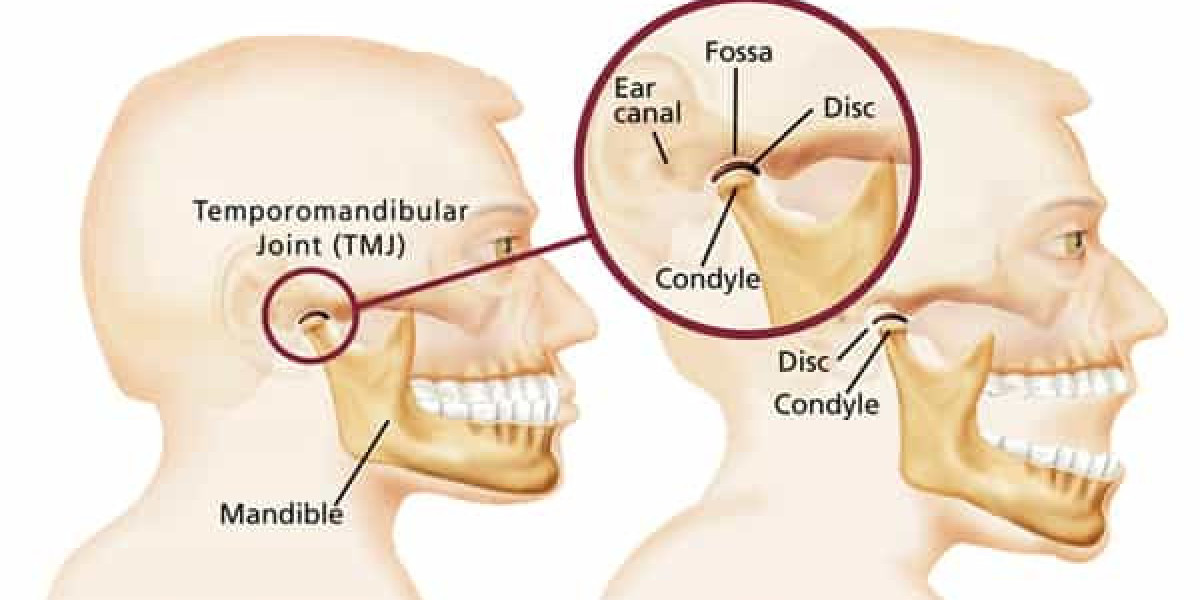INTRODUCTION
The Temporomandibular Joint (TMJ) plays a crucial role in our daily lives, enabling us to talk, chew, and even yawn. However, when this joint starts causing pain, it can lead to significant discomfort and can affect your overall well-being. One of the common questions people ask is whether TMJ joint pain is related to dental problems. This article, written from the perspective of Dr. Tofiq Bohra, the best maxillofacial surgeon in Mumbai, will explore the connection between TMJ joint pain and dental issues. We will also discuss the symptoms, causes, and treatment options available for those suffering from TMJ pain.
Understanding the TMJ
The TMJ is the joint that connects your jawbone to your skull. It is a hinge joint located on both sides of your head, right in front of your ears. This joint allows your jaw to move up and down, side to side, and even forward and backward. Any problem that prevents this complex system of muscles, ligaments, discs, and bones from working properly may result in a painful TMJ disorder.
Symptoms of TMJ Disorder
TMJ disorders can manifest in a variety of ways. Some of the common symptoms include:
- Jaw pain or tenderness: This pain can be localized around the jaw or may radiate to other areas of the face and neck.
- Difficulty chewing: Pain or discomfort while chewing is a common symptom, and it can make eating an uncomfortable experience.
- Clicking or popping sounds: You might hear a clicking or popping sound when you open or close your mouth. This could indicate a misalignment of the TMJ.
- Locking of the jaw: In some cases, the jaw can get locked in an open or closed position.
- Headaches: Frequent headaches, especially in the morning, are often associated with TMJ disorders.
- Ear pain: Since the TMJ is located near the ear, pain may also be felt in the ear, often mistaken for an ear infection.
Is TMJ Joint Pain Related to Dental Problems?
The short answer is yes. TMJ joint pain is often related to dental problems. Dental issues can be both a cause and a consequence of TMJ disorders. Here’s how:
1. Malocclusion (Bad Bite)
One of the most common dental issues linked to TMJ disorders is malocclusion, also known as a bad bite. When your teeth do not align properly, it can cause your jaw to work harder to close, putting extra strain on the TMJ. Over time, this added stress can lead to pain and dysfunction in the joint.
2. Teeth Grinding and Clenching (Bruxism)
Teeth grinding and clenching, also known as bruxism, is another dental issue that can contribute to TMJ pain. When you grind or clench your teeth, often during sleep, it puts tremendous pressure on the TMJ. This constant pressure can lead to inflammation, pain, and eventually, a TMJ disorder.
3. Missing or Misaligned Teeth
Missing teeth or teeth that are misaligned can also cause TMJ problems. When teeth are missing, the jaw has to adjust to compensate, which can lead to misalignment of the TMJ. Similarly, misaligned teeth can force the jaw into an unnatural position, causing stress on the joint.
4. Dental Procedures
Certain dental procedures, such as the placement of crowns, bridges, or braces, can sometimes lead to TMJ pain. If these procedures alter the bite or the alignment of the teeth, they can affect the TMJ’s functioning.
How to Know if Your TMJ Pain is Related to Dental Problems
If you are experiencing TMJ pain, it’s essential to consult with a specialist like Dr. Tofiq Bohra, a renowned TMJ specialist in Mumbai. A thorough examination of your dental history, a physical examination of the jaw, and imaging tests like X-rays or MRIs can help determine if your TMJ pain is related to dental issues.
Treatment Options for TMJ Pain Related to Dental Problems
The good news is that there are various treatment options available for TMJ pain, especially when it is related to dental problems. The treatment approach will depend on the specific cause of the TMJ disorder.
1. Dental Corrections
If your TMJ disorder is caused by malocclusion or misaligned teeth, correcting the dental issue can often relieve the pain. This might involve orthodontic treatment to realign the teeth, or restorative dental work such as crowns or bridges to correct the bite.
2. Mouthguards
For those who grind or clench their teeth, a custom-made mouthguard can be very effective. This mouthguard, worn at night, can prevent teeth grinding and reduce the pressure on the TMJ.
3. Physical Therapy
Physical therapy can help strengthen the muscles around the TMJ and improve joint movement. Specific exercises can relieve tension in the jaw muscles, reducing pain and improving function.
4. Medications
Pain relief medications, anti-inflammatory drugs, and muscle relaxants can be prescribed to manage the pain and inflammation associated with TMJ disorders. In some cases, injections of corticosteroids into the joint may be recommended.
5. Lifestyle Changes
Simple lifestyle changes can also make a significant difference. This includes eating soft foods, avoiding chewing gum, practicing stress-reduction techniques, and applying heat or ice to the affected area.
6. Surgery
In severe cases where other treatments have failed, surgery might be considered. This could involve procedures to repair or replace the joint. However, surgery is usually considered a last resort and is only recommended after careful evaluation by a specialist like Dr. Tofiq Bohra.
Preventing TMJ Pain Related to Dental Problems
Prevention is always better than cure. To prevent TMJ disorders related to dental issues, it’s important to maintain good oral hygiene and have regular dental check-ups. Addressing dental problems such as cavities, misaligned teeth, or missing teeth early on can prevent them from leading to TMJ disorders.
Moreover, managing stress levels can help prevent teeth grinding or clenching, which are common contributors to TMJ pain. If you notice any early signs of TMJ issues, such as jaw discomfort or clicking sounds, it’s crucial to seek advice from a TMJ specialist in Mumbai.
Choose Dr. Tofiq Bohra for TMJ Pain Treatment
Dr. Tofiq Bohra is regarded as one of the best maxillofacial surgeons in Mumbai, with extensive experience in treating TMJ disorders. His approach is comprehensive, taking into account all possible causes of TMJ pain, including dental problems. He offers personalized treatment plans that are designed to address the root cause of the pain, providing long-term relief and improving the quality of life for his patients.
Whether your TMJ pain is related to a dental issue or another underlying cause, Dr. Bohra’s expertise ensures that you receive the best possible care. His commitment to patient well-being and his thorough understanding of TMJ disorders make him the top choice for those seeking relief from TMJ pain in Mumbai.
Conclusion
TMJ joint pain can significantly impact your daily life, but understanding its connection to dental problems can help you find the right treatment. Whether it’s a bad bite, teeth grinding, or other dental issues, addressing these problems can often alleviate TMJ pain. If you’re experiencing symptoms of TMJ disorders, it’s essential to consult with a specialist like Dr. Tofiq Bohra, who can provide the expert care needed to relieve your pain and restore normal function to your jaw.
Maintaining good dental health and seeking timely treatment for any dental issues can go a long way in preventing TMJ disorders. Remember, early intervention is key to managing TMJ pain effectively.
CONTACT US
ADDRESS - Smile Miles Dental Clinic, Shop no 4 , Rose Apartment Hanuman Mandir road, opp. jama masjid, Andheri East, Mumbai, Maharashtra 400059, India
Mobil no - +91-7700051945
INSTAGRAM - https://www.instagram.com/drtofiqbohra_/
Facebook - https://www.facebook.com/tofiq.bohra
Linkedin - https://www.linkedin.com/in/drtofiq-craniofacialsx/








